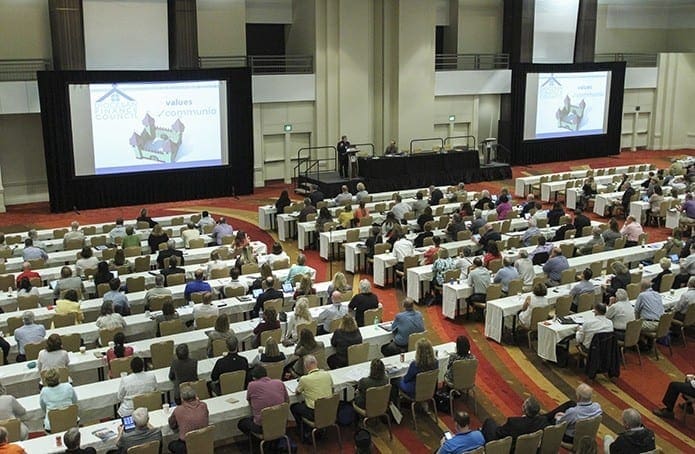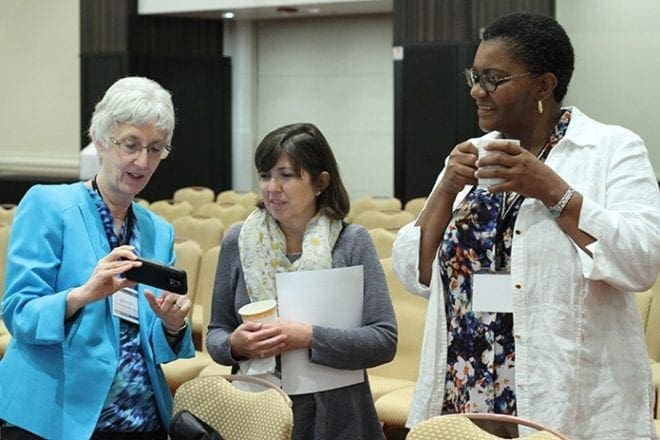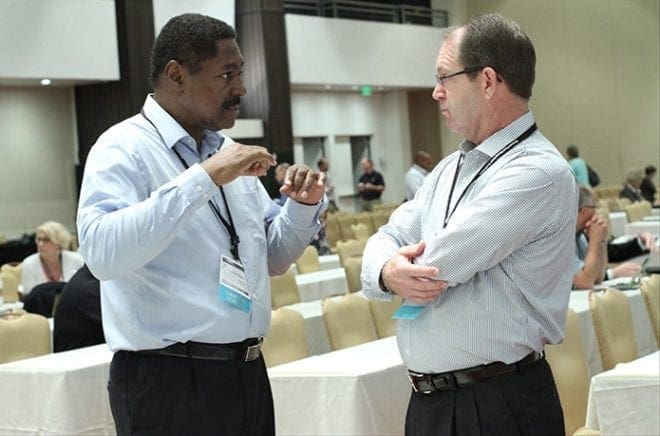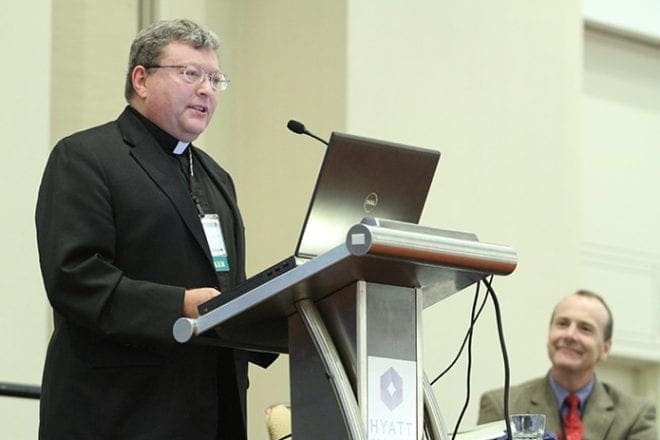 Photo By Michael Alexander
Photo By Michael AlexanderAtlanta
Church fiscal managers challenged to be transparent, have spiritual vision
By NICHOLE GOLDEN, Staff Writer | Published October 29, 2015
ATLANTA—Transparency, compassion, and vision were common themes of the programs offered at the annual meeting of the Diocesan Fiscal Management Conference in Atlanta, Sept. 27-30.
More than 325 fiscal professionals representing dioceses in the United States, Canada and across the globe participated in the DFMC to attend workshops, see exhibitor displays, and collaborate with other financial officers.
Bishop Kevin J. Farrell of Dallas, Texas, episcopal moderator of the DFMC, was celebrant for the opening Mass at the Basilica of the Sacred Heart of Jesus in Atlanta.
During a keynote address, “Leading the Church With Mercy and Compassion,” Archbishop Wilton D. Gregory welcomed participants to the event, being held in Atlanta for the second time since 1989.
He spoke of the legend of St. Lawrence the Deacon, who, when ordered to bring the treasures of the church to the prefect of Rome, gathered all the poor of the city together and presented them.
“The lesson that Lawrence then offered to the Roman prefect, he now offers to all of us, especially to those of you who daily handle the church’s fiscal resources,” said Archbishop Gregory.
“Lawrence reminds us that the real treasures that the church continues to possess indeed are those who are the underprivileged, the marginalized, the neglected, the poor and the ostracized of our world.”
The archbishop said that church assets are intended for the advancement of its mission and never for the mere increase of wealth. Mishandling of church funds also carries a greater consequence, he said.
“The wasteful forfeiture or the tragic mismanagement of the church’s resources are not to be judged merely by the standards recognized by the financial community but by the even more heartbreaking loss of the church’s capacity to care for all those entrusted to our guardianship,” said Archbishop Gregory.
One of the challenges of Pope Francis has been to reform the financial agencies of the Roman Catholic Church, continuing a process started by Pope Benedict XVI.
“Rome itself must be a leader in urging all of us to give an honest accounting of the gifts and the resources that we receive and administer. An indispensable component of that restructuring is called transparency,” said the archbishop.
Transparency may include reporting the financial state of dioceses or parishes, providing highly detailed audit reports, or giving a broad review of the big picture.
“Both styles of transparency are needed to ensure that our people have clear access to the truth,” he noted.
91 percent of fiscal professionals are lay people
Nicole DesOrmeaux, financial controller for the Diocese of Lafayette, Louisiana, was among those attending the conference for the first time.
She had been prayerfully seeking a career path to use her 20-plus years of accounting and business experience to help people and make a difference. She recently joined the diocesan staff in Lafayette and was uplifted by the conference.
“Being a DFMC first-timer, I received confirmation on my career decision to work for the Catholic Church,” said DesOrmeaux. “I left with a desire and hope that God continues to bless me with a long and fulfilling career working for his church.”
DesOrmeaux said the conference strengthened her understanding of issues and challenges and reviewed financial norms and nonprofit accounting disciplines.
Another value of the conference is other members’ encouragement and willingness to share knowledge.
The DFMC promotes members’ spiritual growth, encourages professional relationships, facilitates the exchange of ideas and information and provides fiscal and administrative expertise to the local and national church.

(L-r) Laura Clark, chief financial officer for the Diocese of San Bernardino in California, Bobbi Hanningan, manager of diocesan initiatives for Catholic Extension in Chicago, and Ursula Hinkson, associate director of financial affairs for the Diocese of San Bernardino, converse over a break between general sessions during the annual meeting of the Diocesan Fiscal Management Conference at the Hyatt Regency Atlanta hotel. Photo By Michael Alexander
A conference for those involved in the financial management of dioceses first developed during an informal gathering of six diocesan finance officers at the National Catholic Stewardship Conference in 1969.
In 1988, the push began to broaden the base of involvement. The DFMC restructured with a board of directors representing the membership geographically and numerically. The organization now represents 214 dioceses and eparchies in the U.S., Canada, the Caribbean and Pacific. Lay people make up 91 percent of DFMC fiscal professionals.
Brad Wilson, chief financial officer of the Atlanta Archdiocese, is currently serving as president of the board of directors.
In 2009, the DFMC began formally recognizing the specialized field of study by offering a voluntary certification designation, “Certified Diocesan Fiscal Manager.”
Atlanta workshops, held at the Hyatt Regency, covered the leadership style of Pope Francis, teacher contracts in Catholic schools, crisis management, and international fundraising.
Msgr. William King of the Diocese of Harrisburg, Pennsylvania, former judicial vicar for Atlanta, was among the presenters. Msgr. King reviewed the findings of a 2014 survey by the Canon Law Society of the functioning of finance councils.
Turnaround stories at two immigrant parishes
In one well-attended and timely session, two Texas priests shared their experiences in helping immigrant parishes thrive spiritually and financially.
Father Gerald Goodrum of the Archdiocese of Galveston-Houston and Father Mark Hamlet of the Diocese of Austin presented “The Immigrant Parish: Towards Fiscal Self-Sustainment.”
Father Hamlet began the program with an honest tackling of the stereotype that immigrants don’t support the church.
“You ever heard that?” he asked. “We haven’t found that in our experience.”
Ordained five years ago, Father Hamlet previously had a 30-year career in international business and speaks Spanish. He was named pastor of Sacred Heart Church in Austin in July 2012. The Hispanic parish had closed its school, was in debt, and its sacramental recordkeeping was in shambles.
“Religious education was out of control when I got there,” said Father Hamlet. “It was a shabby place. The parish saw itself as poor. It was told it was poor. Hope was not a big thing in our community.”
No one told the pastor a turnaround couldn’t happen, and Father Hamlet began creating an atmosphere of personal stewardship. He initiated a family night once a week for adult formation and scouting groups for children, pro-life festivals with ultrasounds on the big screen, made reconciliation more available, and introduced a barrier-free Catholic education program. Those who cannot afford tuition bring in a letter of acceptance, and a means is worked out for the children to attend school.
“It’s not about the money. You build trust,” said Father Hamlet.

Warren Bush, left, chief financial officer for the Diocese of St. Thomas in the Virgin Islands, speaks with Steve McKay, chief financial officer for the Diocese of San Angelo in Texas, about some of the approaches that have worked in his diocese in the area of fiscal management. Photo By Michael Alexander
Part of the trust is transparency and publishing how collections are spent.
It may be rare that a parishioner wants to see the entire financial picture, he said, but if so, give them everything. “They were going to feel like you were open.”
Religious education should be continual to increase attendance, said the priest, and not tied to sacramental events. A four-week program, “You Can Count on Me,” teaches what it means to be a parishioner.
“The Mass is the key to the family celebration,” emphasized Father Hamlet.
As after any family meal, the priest, not the lector, should make the parish announcements so he can demonstrate awareness of community, he said.
A positive office staff is important as well, said the priest.
“We just give service,” said Father Hamlet.
Between 2011-12 and the most recent fiscal year, the parish revenue increased by 68 percent, and it now has no debt.
“Separately, we may be poor, but together we’re rich,” said Father Hamlet. “Give ‘em hope. … Teach them like Francis does. … Love them.”
Using statistics from the Texas Data Center, Father Hamlet talked about the demographic shift in the state as Hispanics now number 10 million, nearly half of the population. This is not just due to immigration, but the birthrate in Hispanic families, which is twice the birthrate in Anglo families, he said.
“By 2020, the majority population in Texas will be Hispanic,” he said.
At the same time, Hispanic income levels are not likely to rise because there are no educational initiatives addressing those needs, said the priest.
“We are in the transcendence business”
Father Goodrum found the same dire situation when arriving at his new assignment in 2013. The parish was $1.1 million in debt to the archdiocese, had never met a diocesan service fund goal, and had only $800 in savings.
“It’s about rolling up your sleeves and getting your hands dirty,” said Father Goodrum. “We made a transition within 22 months.”
Now the 98-percent Hispanic parish has no debt, has met fund goals, and has plentiful savings.
The pastor’s first step was to meet with the chief financial officer of the archdiocese to see how they could collaborate. The loan interest rate was cut by 3.2 percent and fund obligations were forgiven if the parish promised to meet future goals.
“It gave me leverage as a pastor to go back to the people and say, look, the archdiocese is really assisting us, and we’re going to collaborate to build our future.”

Msgr. William J. King, pastor of St. Elizabeth Ann Seton Church, Mechanicsburg, Pa., and former diocesan judicial and general vicar for the Diocese of Harrisburg, gives a presentation entitled “The Diocesan Finance Council: Vision, Value, and Variety.” It took place during a session of the Diocesan Fiscal Management Conference’s annual meeting in Atlanta Sept. 29. Listening from the dais to the side is Brad Wilson, Archdiocese of Atlanta chief financial officer. Photo By Michael Alexander
A daunting task became something possible with the help of the archdiocese, said Father Goodrum.
He began looking at all expenditures asking, “Do we need this?” The pastor formed a team of licensed workers to complete jobs at the parish plant for free, saving $50,000 a year.
Another important facet is teaching children that collections or offerings are important. Increasing Mass attendance is vital, he said.
“People love beauty. We are in the transcendence business,” said Father Goodrum. “We spent quite a bit of money on our liturgy.”
Any parish facing financial struggles must learn that it’s really about working together, setting goals, using established protocols and common sense.
“It’s hard work. Get everyone on board,” said Father Goodrum.
As DFMC members headed back to their respective dioceses with new knowledge, they are also looking ahead to next year’s conference, scheduled for Sept. 18-21 in San Diego.
DesOrmeaux related closely to Archbishop Gregory’s words in his closing homily about God being a “God of surprises.”
DesOrmeaux said the surprise for her was to be in the presence of so many talented and motivated people at the DFMC.
“It was a privilege to pray with them daily at the Eucharistic celebration, which united us not only in purpose but in heart,” she said.